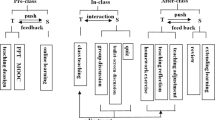Abstract
Blended learning in recent years has received intensive attentions in education, which combines the traditional offline teaching and emerging online teaching to improve the learning effects. For blended learning, there are many hot topics which are required to explore. In this paper, we comprehensively survey the state-of-the-art development of blended learning, specifically, we review the connotation and types of blended learning and further six patterns of blended learning are clearly discussed in detail, they are face-to-face driver, rotation, online lab, flex, self-blend and online driver. The applications of these patterns are fully summarized according to existing works. Also we compare the blended learning with traditional learning and online learning in locations, learning approaches, technology use, flexibility, sense of participation, interaction and evaluation. Finally, to improve the effects of blended learning, we present two strategies for optimizing blended learning, one is using intelligent technologies augment teacher preparations, another is building customized learning experience.
Access this chapter
Tax calculation will be finalised at checkout
Purchases are for personal use only
Similar content being viewed by others
References
Ariawan, S., Aji, A.B., Tawil, T.: Pengaruh blended learning flex model berbantuan media video terhadap hasil belajar ipa materi ekosistem. Borobudur Educ. Rev. 1(01), 44–56 (2021)
Asadchih, O., Dybska, T.: The experimental testing of blended learning methods of oral Japanese language teaching aimed at future philologists. ScienceRise Pedagogical Educ. 3(36), 58–61 (2020)
Berga, K.A., et al.: Blended learning versus face-to-face learning in an undergraduate nursing health assessment course: a quasi-experimental study. Nurse Educ. Today 96, 104622 (2021)
Delialioglu, O., Yildirim, Z.: Students’ perceptions on effective dimensions of interactive learning in a blended learning environment. J. Educ. Technol. Soc. 10(2), 133–146 (2007)
Evanini, K., Hauck, M.C., Hakuta, K.: Approaches to automated scoring of speaking for k-12 English language proficiency assessments. ETS Res. Rep. Ser. 2017(1), 1–11 (2017)
Hadjerrouit, S., et al.: Towards a blended learning model for teaching and learning computer programming: a case study. Inform. Educ. Int. J. 7(2), 181–210 (2008)
He, K.: New development of educational technology theory from blending learning. E-education Research (2004)
Hofraann, J.: Blended learning case study [eb/ol]. http://www.insynctraining.com/pages/blendedcasestudy.pdf
Kundu, A., Bej, T., Rice, M.: Time to engage: implementing math and literacy blended learning routines in an Indian elementary classroom. Educ. Inf. Technol. 26(1), 1201–1220 (2021)
Li, J.: About the definition of blended learning. http://www.jeast.ne/jiahou/axehives/000618.html
Li, K., Zhao, J.: Principles and application modes of blended learning. e-Education Res. 07, 1–6 (2004)
Lockee, B.B.: Shifting digital, shifting context: (re)considering teacher professional development for online and blended learning in the COVID-19 era. Educ. Technol. Res. Dev. 69(1), 17–20 (2021)
Mathew, A.N., Paulose, J., et al.: NLP-based personal learning assistant for school education. Int. J. Electr. Comput. Eng. (2088–8708) 11, 4522–4530 (2021)
Orey, M.: Definition of blended learning. University of Georgi, 21 February 2003 (2002)
Rao, V.: Blended learning: a new hybrid teaching methodology. Online Submission 3, 1–6 (2019)
Singh, H., Reed, C., et al.: A white paper: achieving success with blended learning. Centra Softw. 1, 1–11 (2001)
Stanislaus, I.: Forming digital shepherds of the church: evaluating participation and satisfaction of blended learning course on communication theology. Interact. Technol. Smart Educ. 19, 58–74 (2021)
Swathilakshmi, V., et al.: Student suite+, a closed domain question answering system for educational domain. Turk. J. Comput. Math. Educ. (TURCOMAT) 12(10), 3168–3172 (2021)
Syakur, A., Fanani, Z., Ahmadi, R.: The effectiveness of reading English learning process based on blended learning through “absyak” website media in higher education. Bp. Int. Res. Critics Linguist. Educ. (BirLE) J. 3(2), 763–772 (2020)
Tebbs, O., Hutchinson, A., Lau, R., Botti, M.: Evaluation of a blended learning approach to developing specialty-nursing practice. An exploratory descriptive qualitative study. Nurse Educ. Today 98, 104663 (2021)
Troussas, C., Krouska, A., Alepis, E., Virvou, M.: Intelligent and adaptive tutoring through a social network for higher education. New Rev. Hypermedia Multimedia 26(3–4), 1–30 (2021)
Wang, N., Chen, J., Tai, M., Zhang, J.: Blended learning for Chinese university EFL learners: learning environment and learner perceptions. Comput. Assist. Lang. Learn. 34(3), 297–323 (2021)
Wi, S., Wu, K., Zhu, B., Wang, S.: Voice assessment technology helps oral English teaching and evaluation. AI View 3, 72–79 (2019)
Zhang, L.: A new machine learning framework for effective evaluation of English education. Int. J. Emerg. Technol. Learn. 16(12) (2021)
Zhao, L., Pan, Z.: Research on online course recommendation model based on improved collaborative filtering algorithm. In: 2021 IEEE 6th International Conference on Cloud Computing and Big Data Analytics (ICCCBDA), pp. 437–440. IEEE (2021)
Acknowledgements
This research was supported by Research on the Practice of Online and Offline Blended Teaching (No. SZIIT2021SK035), Research on the High Quality Development of Shenzhen Industrial System Under the New Development Pattern of Double Cycle (No. SZIIT2021SK010)
Author information
Authors and Affiliations
Editor information
Editors and Affiliations
Rights and permissions
Copyright information
© 2022 Springer Nature Switzerland AG
About this paper
Cite this paper
Li, Y., Xu, J., Lin, X. (2022). A Survey: The State-of-the-Art Development of B-Learning Services. In: Katangur, A., Zhang, LJ. (eds) Services Computing – SCC 2021. SCC 2021. Lecture Notes in Computer Science(), vol 12995. Springer, Cham. https://doi.org/10.1007/978-3-030-96566-2_3
Download citation
DOI: https://doi.org/10.1007/978-3-030-96566-2_3
Published:
Publisher Name: Springer, Cham
Print ISBN: 978-3-030-96565-5
Online ISBN: 978-3-030-96566-2
eBook Packages: Computer ScienceComputer Science (R0)





